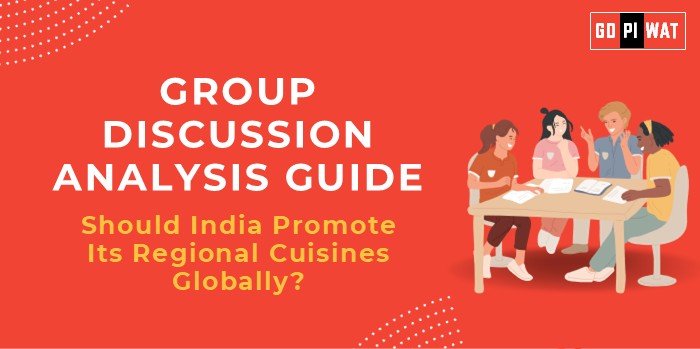📋 Group Discussion Analysis Guide
🍴 Should India Promote Its Regional Cuisines Globally?
🌟 Introduction to the Topic
Regional cuisines reflect India’s cultural diversity and rich heritage. With globalization shaping culinary trends, promoting Indian regional cuisines can elevate India’s cultural diplomacy and economic influence.
Background: Indian cuisine, a blend of history and culture, is renowned globally. However, its representation often revolves around a few popular dishes like butter chicken or biryani. Enhancing the visibility of diverse regional cuisines could transform India’s soft power and economic footprint.
📊 Quick Facts and Key Statistics
- Indian Food Industry: Valued at $41 billion in 2023, projected to grow at 10.5% CAGR (NRAI Report).
- Global Reach: Indian restaurants account for ~12% of ethnic dining in the US and UK.
- Exports: Spices worth $4.1 billion were exported in FY 2023 (Spices Board of India).
- Cultural Tourism: Culinary experiences contribute to 30% of India’s inbound tourism revenue.
🏛 Stakeholders and Their Roles
- Government Bodies: Promote through initiatives like “Incredible India” campaigns.
- Food Industry Entrepreneurs: Innovate and package regional dishes for international palates.
- International Organizations: Collaborate for cultural exchange programs.
- Chefs and Culinary Experts: Act as ambassadors, creating authentic regional experiences abroad.
✅ Achievements and Challenges
Achievements:
- Indian diaspora popularizing dishes globally (e.g., butter chicken).
- UNESCO recognition of Indian culinary traditions (e.g., Durga Puja Bhog).
- Emergence of regional cuisines in Michelin-starred restaurants.
Challenges:
- Lack of standardization in recipes and taste.
- Limited global awareness of regional variety (e.g., Chettinad or Kashmiri Wazwan).
- Supply chain and logistical hurdles for authentic ingredients.
🌏 Global Comparisons
- Japan: Sushi globalized through cultural promotion and quality standards.
- Italy: Protected Designation of Origin (PDO) ensures authenticity of regional foods.
📚 Case Studies
- Kerala’s jackfruit festival promoting its dishes globally.
- Punjab exporting packaged lassi and ready-to-eat meals.
💬 Structured Arguments for Discussion
- Supporting Stance: “Promoting regional cuisines globally enhances India’s soft power and boosts its food export economy.”
- Opposing Stance: “Globalizing regional cuisines risks cultural dilution and misrepresentation.”
- Balanced Perspective: “With the right policies and authentic representation, India can balance tradition and globalization effectively.”
⚙️ Effective Discussion Approaches
- Opening Approaches:
- Highlight India’s culinary diversity as a unique soft power asset.
- Use statistics on the economic impact of food tourism.
- Counter-Argument Handling:
- Acknowledge the risks of misrepresentation but emphasize the role of education and chef training programs.
🔍 Strategic Analysis of Strengths and Weaknesses
SWOT Analysis:
- Strengths: Diverse cuisines, vibrant diaspora, global recognition.
- Weaknesses: Lack of standardization, limited infrastructure.
- Opportunities: Growing interest in ethnic foods, cultural diplomacy.
- Threats: Misrepresentation, competition from established cuisines like Italian or Chinese.
💼 Connecting with B-School Applications
- Real-World Applications: Marketing strategies for food-based tourism; export strategies for niche products.
- Sample Interview Questions:
- “What strategies can make Indian cuisines globally competitive?”
- “How can promoting regional cuisines align with India’s soft power objectives?”
- Insights for B-School Students:
- Explore business opportunities in culinary entrepreneurship.
- Study the role of branding in global food markets.


